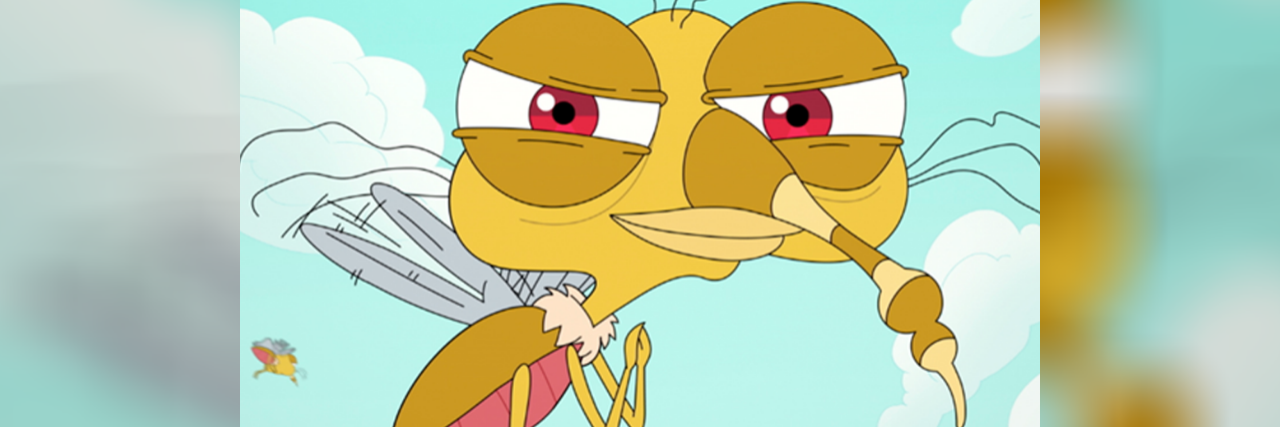Why the Representation of Anxiety in 'Big Mouth' Is Actually Genius
Editor's Note
This article contains spoilers for “Big Mouth.”
Andrew Goldberg and Nick Kroll have done it once again — they have personified a mental illness with brilliance and accuracy while never shy of the pursuit of raunchiness. Their initial debut of the show, “Big Mouth,” had a tone of pure hilarity with hormone monsters playing the raging bodily chemicals that come with puberty. Then came Depression Kitty in Season 2, with more serious conversations about a common mental illness in teens.
Continuing this trend in the latest season is a new character that handily pairs with depression, you guessed it — anxiety. The two piggyback on each other’s seizure of the teens’ insecurities this season. This character is played by none other than Maria Bamford, a dark-humored comedian who is outspoken about her own struggles with depression and anxiety and lends her experiences seamlessly to Tito.
Now, I’m not going to go ahead and tell every anxious person to go and watch this season right away, as this character can be potentially triggering. But, in my personal experience as an anxious person, it was refreshing to put a face and name to that voice inside my head. It isn’t always a joy to be reminded of your struggles, but it certainly was reassuring to remind myself that those intrusive thoughts I get on the day to day are not my own thoughts. They are from an outsider churning up outrageous scenarios that are not likely to happen.
It was genius to use a mosquito to play this role, with its incessant annoyance, dainty limbs and shriveled frame. This image exposes both the commitment anxiety has to its victims and the exhaustion and distress that results from such abuse. Its constantly overwhelming state is a picture of what so many people go through every day about the most mundane inconveniences.
Its introduction comes after Tito bites Nick’s arm; the mosquito exhibits how quickly a minor inconvenience, such as that of a mosquito bite, can escalate to self-hate. “I’m sorry, people hate it when I do that. People hate it when I do everything. But do I stop? No!” People who endure anxiety know that these overreactive thoughts are almost second-hand to them, that blow the current situation out of proportion and needlessly attack their self-worth.
Whether it was Jessi having a lengthy menstrual period, Nick reluctant to hit the showers in front of other male campers, or Andrew being convinced that his alteration of his masturbation routine led to his grandfather’s death, Tito displayed how anxiety targets timidity. The mosquito continues to chip away at their confidence with nasty comments and lead them to feel increased self-doubt.
This season also demonstrated that anxiety doesn’t affect everyone equally. While Jessi and Nick got most of the attention from the irritable insect, Andrew was only paid a single visit throughout the season. While no one person is immune to the emotions of stress and worry, anxiety, for some, is a monster that meets every life situation, no matter the seriousness, with never ending questions of how the scene will play out.
We also get to see how the characters attempt to handle these overwhelming emotions. At times, Jessi and Nick would accept the thoughts as reality, while other times the anxiety created a warranted outburst. Depending on what’s going on in our lives, we are more or less equipped to fight off the demon in our heads. This variance of our ability to cope was captured beautifully throughout the season. They bring to life how easy it can be at times to accept anxious thoughts for face value, instead of seeing them for what they are — an intrusion on our psyche.
Luckily by my 23rd year, I have found the right therapist who is working with me on identifying anxiety when it is present and giving it a name, in order to separate the intrusions from my own organic thinking. Without doing so, I can fall down a hole, believing most of the negativity that floods my brain. To do this, I have named my anxiety Margaret, similar to the premise of Tito, the Anxiety Mosquito.
Gratitoad enters as the antidote to a season full of intimidating mental chaos. As you probably have guessed, Gratitoad is the on-screen representation of gratitude, suggested as a way to cope with anxiety. It seems pretty simplified to suggest gratitude alone can make anxiety go away, but it is certainly a universal practice that will reach its primary audience. Zach Galifianakis, the voice of Gratitoad also makes sure to remind us that anxiety isn’t cured but rather something we must keep fighting. Galifianakis is another flawless casting decision as he often appears in movies as the comic relief character.
I wish I had seen this portrayal of anxiety and coping mechanisms when I was in my teen years, but its availability to today’s struggling teens gives me hope. It is dire that we all work together to create resources that are minimally provided by the government as we see teen suicides skyrocketing.
Vulnerable teens can see that often their peers are going through similar tribulations and this will hopefully allow them to feel a sense of solidarity on their mental health journeys. I also think the scene of Jessi in a therapist’s office, despite her short stay, will normalize the prospect of therapy to kids who aren’t as open to the option. It was no surprise that a teen felt uncomfortable opening up to a complete stranger, as it can take a few sessions to become less reluctant sitting with painful emotions.
Follow this journey on sincerelyabby.

